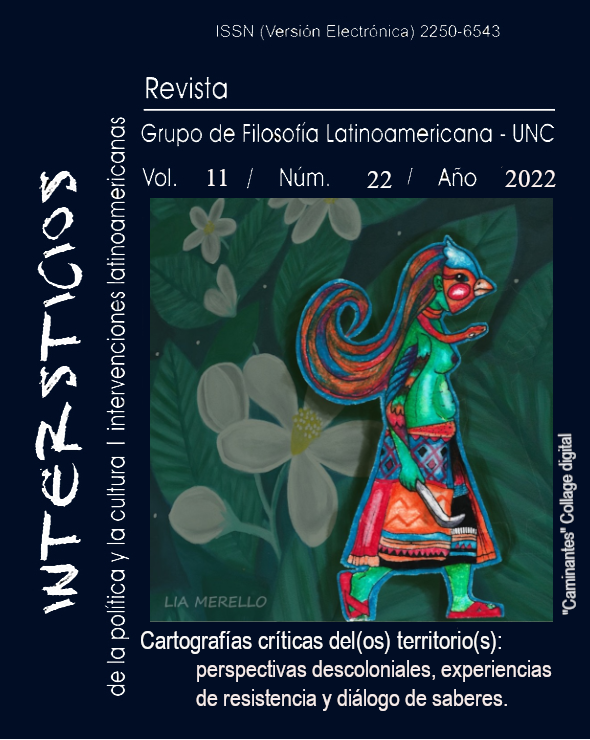"Taking care of the palm": spatiality of practices around the selection, collection and preparation of material for weaving carried out by Qom women artisans
Keywords:
qom women, artisans, spatial practices, territory, Santa Fe (Argentina)Abstract
The Qom are a group centered on the urban fringes of the municipality of Santa Fe, Argentina. Two communities are located in this area, the Qom Las Lomas community and the Qomlashi Lma Nam Qom community (also known as Santo Domingo). The women of both communities perform various tasks of basketry with a natural fiber called palm. Some of them are grouped under the form of a cultural work cooperative, which bears the name of Qom Alphi.
These indigenous artisans have been developing different productive and reproductive tasks that can be thought of from categories such as spatial practices. These practices materially and symbolically configure the territories they inhabit. In turn, these territories can be integrated into a broader structure that makes it possible to understand the spatial circuits of palm production.
Under this analytical scheme, the present work gives an account of the spatial production practices of the group of women that make up the cooperative, with main emphasis on what could be considered the beginning of the circuit: search, selection and preparation of the material for weaving. In this instance we recognize the coexistence of productive and reproductive times, which are difficult to dissociate. To do this, following the geographies of everyday life, it focuses on two spacial dimensions: displacements and practices anchored in the place. However, the analysis does not end there, since it makes them dialogue with other visions on spatial practices such as those of Lopes de Souza (2013).
This work aims to account for the spatiality of the practices associated with the supply and preparation of the material, for which it uses methodologically the ethnographic record made during work days accompanying the women in their tasks, as well as the use of semi-structured interviews.
Downloads
References
Domínguez, Diego (2016). Territorialidades campesinas entre lo disidente: formas de gestión de la producción y tenencia de la tierra en el campo argentino. Revista de Ciências Sociais (45), 67-84. Recuperado de: https://ri.conicet.gov.ar/handle/11336/77696
Glur, Gabriela; Fritschy, Blanca (2014). Análisis de la variable situación económica en la ciudad de Santa Fe según encuestas de 2011. Contribuciones Científicas GÆA, 26, 129-141. Recuperado de: https://gaea.org.ar/contribuciones/Contribuciones2014/Glur.pdf
Gómez, Mariana (2008). Las formas de interacción con el monte de las mujeres tobas (qom), Revista Colombiana de Antropología, 44 (2), 273-404. Recuperado de: https://www.redalyc.org/pdf/1050/105012451005.pdf
Gómez, Mariana (2016) Guerreras y tímidas doncellas del Pilcomayo. Las mujeres tobas (qom) del oeste de Formosa. Buenos Aires, Argentina: Editorial Biblos.
Gómez, Néstor (2011) “Segregación residencial en el Gran Santa Fe a comienzos del siglo XXI”, Bitácora 19(2) 63-74. Recuperado de: https://dialnet.unirioja.es/servlet/articulo?codigo=5044785
Haesbaert, Rogerio (2011) El mito de la desterritorialización: “del fin de los territorios” a la multiterritorialidad. Argentina, Buenos Aires: Siglo XXI.
Lefebvre, Henry (1991) The production of space. Inglaterra, Oxford: Blackwell.
Lindón, Alicia (2006) Geografías de la vida cotidiana. Lindón, A. y Hiernaux, N. (Comps.) Tratado de Geografía Humana (pp. 356-400). España, Barcelona Editorial Arthropos.
Lopes de Souza, Marcelo (2013). Práticas espaciais. Souza, M. L. Os conceitos fundamentais da pesquisa sócio-espacial (pp. 235-260). Río de Janeiro, Brasil: Bertrand.
Martínez, María Eugenia y Villarreal, Claudia (2016) Pueblos mocoví y qom en los espacios urbanos de la provincia de Santa Fe. Ministerio de Educación y Deportes de la Nación.
Moraes, Antonio (1989) Los circuitos espaciales de la producción y los círculos de cooperación en el espacio. Yanes, L. y Liberali, A. M. (Comp.), Aportes para el estudio del Espacio Socio-Económico (pp. 153-177). Argentina: Buenos Aires: El Coloquio.
Restrepo, Eduardo (2016) Etnografía: alcances, técnicas y éticas. Colombia, Popayán: Samava Impresiones.
Tamagno, Liliana y Maidana, Carolina (2011) Grandes urbes y nuevas visibilidades de la diversidad. Revista Brasileira de Estudos Urbanos y Regionais, 13(1), 51-61. Recuperado de: https://doi.org/10.22296/2317-1529.2011v13n1p51
Tramontani Ramos, Tatiana (2010) Heterotopias urbanas: Espaços de poder e estratégias sócio-espaciais dos Sem-Teto no Rio de Janeiro. Polis, Revista de la Universidad Bolivariana, 9(27), 293-313. Recuperado de: https://www.redalyc.org/articulo.oa?id=30515709013
Vivaldi, Ana (2016). Fuera del Chaco. Movilidad, afecto y género en los desplazamientos de familias qom a la Ciudad de Buenos Aires. Tola, F. y Suárez, V. (Comp.) El teatro chaqueño de las crueldades memorias qom de la violencia y el poder (pp. 153-177). Argentina, Buenos Aires: Asociación Civil Rumbo Sur.
Downloads
Published
Issue
Section
License

This work is licensed under a Creative Commons Attribution-NonCommercial-ShareAlike 4.0 International License.
Authors who have publications with this journal agree to the following terms:
a. Authors will retain their copyright and grant the journal the right of first publication of their work, which will simultaneously be subject to the Creative Commons Attribution License that allows third parties to share the work as long as its author and first publication in this journal are indicated.
b. Authors may adopt other non-exclusive license agreements for distribution of the published version of the work (e.g., deposit it in an institutional telematic archive or publish it in a monographic volume) as long as the initial publication in this journal is indicated.
c. Authors are allowed and encouraged to disseminate their work through the Internet (e.g., in institutional telematic archives or on their web page) after the publication process, which may produce interesting exchanges and increase citations of the published work (see The effect of open access).


